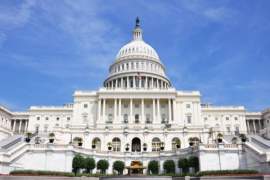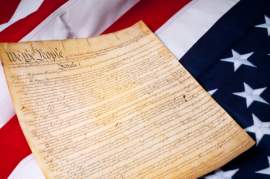
Does The SC Review Enough Cases

Popular In Constitution
Purpose Of Lifetime Appointment And Pros And Cons Enumerated Powers Bicameral Legislature Background Article 3 Of The Constitution We The People 1st Amendment Who Wrote The Constitution Judicial Review Equal Protection Clause 5th Amendment 10th Amendment Three Fifths Compromise
The U.S. Supreme Court, the highest judicial body in the United States, was designed and structured to not only be the leader of Federal judiciary proceedings, but to be the third tier of power, overseeing the legislative and executive branches of government. Its job is to hear cases that have been appealed up to the Supreme Court or cases that challenge the interpretation of Federal law.
The Supreme Court is made up of one Chief Justice and eight Associate Justices, whom have a life tenure and serve until death, resignation, retirement, or impeachment. When potential Court cases are reviewed by the Justices of the Supreme Court, if any four of the nine Justices want to hear a case, the case will be formally heard in the Court. Recently, however, the Court has come under much criticism for hearing progressively fewer cases, specifically since the 1980s.
Reasons for the Shrinking Supreme Court Agenda
Since the inception of the U.S. Supreme Court, the number of cases heard by the Supreme Court rose consistently every year until the 1980s, when it heard approximately 150 cases a year. As of 2009, the number of cases heard by Supreme Court Justices every year has dropped to about half as many. In fact, the 75-80 cases that are heard by the Court are taken from a list of as many as 8,000 proposed cases.
As concern over the dwindling Supreme Court case docket reached public attention, Yale Law School held a conference to determine the reasoning behind it. Although the exact reasoning was not determined without any doubt, there were several theories that were created to explain it. Some theories accused the current Justices for choosing fewer cases to make a court decision, while others believe that the Supreme Court clerks are to blame. Other theories and reasoning behind the shrinking list is that the Justice Department has begun to make fewer appeals and even Congress was blamed for not making legislation "vague" enough to be left up to Court interpretation.
One of the most convincing arguments, however, came from a researcher at University of Minnesota Law School, who claimed that the five replacement Justices that took over in 1986 clearly voted to hear cases far less often than the Justices that preceded them. As the 1980s came to a close, data suggests that the drop off in the number of Supreme Court cases is undeniably staggering, leading many to believe that the new Justices are to blame.
The biggest difference was between Justice Byron R. White and his replacement, Justice Ruth Bader. White voted to hear an average of 216 cases per year, a considerably larger number than Bader, who only voted to hear 63 cases in 1993. Additionally, Justice Clarence Thomas only voted to hear 72 cases, as opposed to his predecessor, Justice Thurgood Marshall's 125 cases. Justice David H. Souter voted to hear 83 cases, while his predecessor, Justice William J. Brennan Jr. voted to hear 129. Interestingly enough, even the justices who remained active after the personnel change in 1986 voted to see a fewer amount of cases, though the drop off in numbers was not quite as steep as the new Justices.
Throughout the 1990s, the trend continued and reached a new low in the decade to follow, as only 70 cases were heard total in 2007. It should also be noted, however, that between the years of 1989 and 1991, the number of Justices other than the Chief Justice that made the Supreme Court decisions pool grew from six to eight members. This may have also been a contributing factor to the smaller number of cases that received a court decision, according to Kenneth W. Starr, who was a former appeals court judge.
Another possible contributing factor often theorized is the number of petitions filed by the Solicitor General, the representative of the Federal Government within the Supreme Court, has shrunken from 29 to about 16 in the four terms before the previous term.
Approval and Criticism of the Declining Supreme Court Decisions
Many scholars today believe that the Supreme Court is not working at its fullest capacity and should be more proactive in discussions which are held at a lower court level. They feel that it is their responsibility to hear a case and reach a decision to help interpret the law of the United States. There are, however, many respected opinions that support the decline in Supreme Court decisions.
Many people believe in the importance that of a Court decision should only be made if truly necessary, otherwise the other branches of government or the lower courts will perform an adequate enough job in enforcing such decisions as needed. Trusting the Supreme Court in deciding which cases to hear is just as important as trusting the decisions they make in the cases that they do hear.
NEXT: Federal versus State Power





















